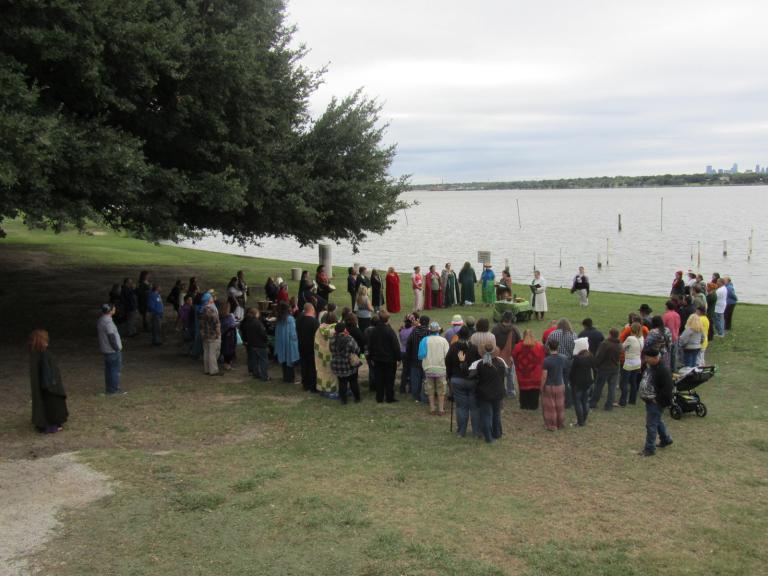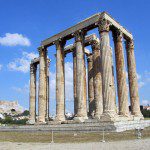For my presentation at Many Gods West, I spoke from a ten page outline and it took a little over an hour to go through it. So it’s not possible to simply post my presentation. What follows is my attempt to fill in the outline with what I think I said or what I wish I had said and still have it at a readable length.
The Future of Polytheism
Imagine the polytheist restoration has happened. Maybe that’s 20 years in the future, maybe 50, maybe 200. When isn’t important – what’s important is that the Way of the Gods has been restored, or if you prefer, re-created. It’s not a polytheist Saudi Arabia. We still have Christians and Buddhists and atheists – we’re still a pluralist society. But polytheism is the predominate religious outlook.
What do you see? What do you see as you go to work? What do you see as you go about your business? What do you see on a high day or a holy day?
Every time I’ve done this presentation, the responses have fallen into three categories:
- Individual spirituality, political activism and alternatives to mainstream culture – more of what we have today in the Pagan world.
- Temples, clergy, Pagan schools and universities – things we see in the mainstream religions.
- “Peace, love, and understanding” – generic good stuff that can be found in all liberal religions.
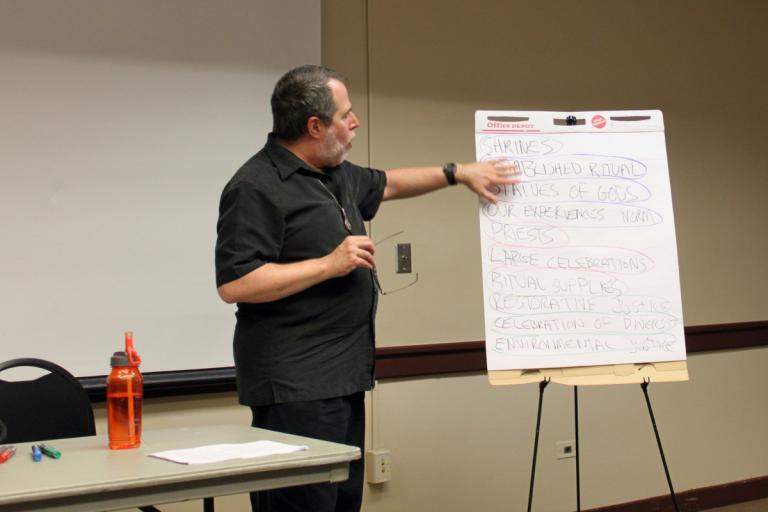 Even at Many Gods West, one of the greatest gatherings of polytheists in the past 1400 years, we were all thinking in terms of what’s available today. But the polytheism of the future must fit the society of the future. What does the future need?
Even at Many Gods West, one of the greatest gatherings of polytheists in the past 1400 years, we were all thinking in terms of what’s available today. But the polytheism of the future must fit the society of the future. What does the future need?
Predicting the Future
When I was in kindergarten my favorite book was You Will Go To The Moon. The future was supposed to be flying cars, cities on the moon, and 20 hour work weeks. Instead, we got the internet, smart phones, and Wal-Mart. Can we do any better at predicting the future?
The driving forces in today’s world are globalization, population dynamics (falling birthrates in the West, exploding populations in the global South), climate change and peak oil. Will 2065 in the West look just like 2015, only with worse weather and higher energy prices? Or will we see dense, compact cities for the rich, decaying suburbs for the poor, and exurbs returned to farmland? Or something else only some random futurist is even contemplating? I don’t know and I don’t think we can know.
We cannot draw a blueprint for the Pagan world of 2065. Given this uncertainty, how can we – us, here and now – possibly build the institutions the Way of the Gods needs?
The Need for Institutions
Pagans tend to have issues with institutions. Polytheists tend to view them a little more favorably, although we’re still suspicious. But make no mistake – the Way of the Gods needs institutions.
After Justinian closed the philosophy schools in the sixth century, pagan philosophy lost its access to institutions, and thus lost its capacity to sustain a developing tradition. Pagan philosophy from the dark ages until the middle of the twentieth century had been about only three things: pantheism, Neo-Platonism, and Humanism, corresponding to the earth, the gods, and the soul.
But in the 1970s, with the introduction of second-wave feminism, that capacity returned. Now it could also be about a fourth thing: power, especially the dynamics of male and female power, and the just and unjust exercise of political power.
Brendan Myers: The Earth, The Gods and The Soul
Ideas need institutions to flourish. Polytheism needs institutions to flourish. The Way of the Gods needs institutions to flourish. But what institutions shall we build? We can build anything we can imagine, but our imagination is limited by what we think is possible.
Look at an institution we’re all familiar with – the megachurch. What do you see? Not what do they preach – what does their institution look like? I see big buildings, a big staff, a big parking lot, and lots of people driving long distances. This requires large numbers of wealthy donors, which requires cheap oil. When the oil runs out, there can be no megachurch. They’ve spent hundreds of millions of dollars and countless hours building something that’s not sustainable.
The organization and infrastructure to serve the Pagans and polytheists of the future must be suitable for the environment of the future. We’re not there yet – our job in 2015 is to prepare the Way of the Gods. How do we do that?
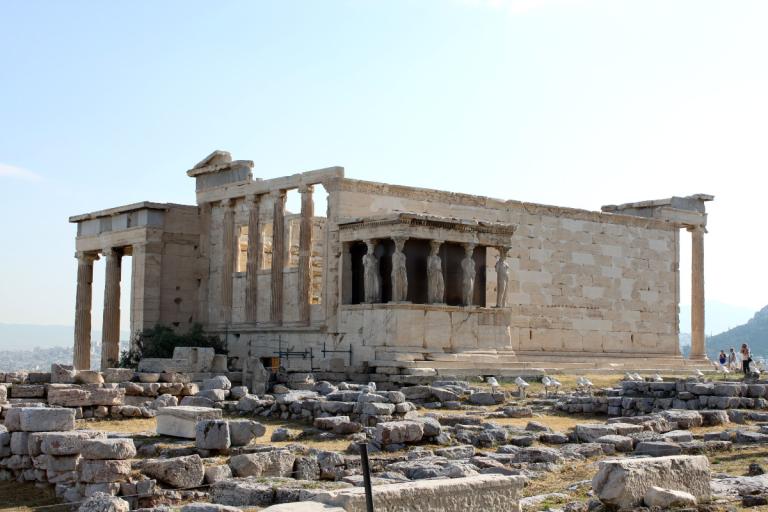 We do it by keeping our focus off infrastructure and on practice. We build the institutions we need right now and not the ones we think we might need 10 or 20 or 50 years in the future. “If you build it they will come” was a great movie line but it’s an ineffective way to build a religion – just look at all the Pagan storefront failures over the past 20 years or so.
We do it by keeping our focus off infrastructure and on practice. We build the institutions we need right now and not the ones we think we might need 10 or 20 or 50 years in the future. “If you build it they will come” was a great movie line but it’s an ineffective way to build a religion – just look at all the Pagan storefront failures over the past 20 years or so.
This is very hard for me. I’m an engineer – I like blueprints and project plans. But it’s a necessary approach.
The Way of the Gods: What Institutions Does It Need?
Priesthood
The wider Pagan community is still arguing about who and what a priest really is. We’re influenced by the Pagan desire for egalitarianism and the Protestant idea of “the priesthood of the believer.” This constantly challenges us to separate the role of the priest from the role of the devotee.
What do priests do? Priests serve the Gods, mediate for the Gods, and serve the community. It’s not that only priests can do these things – anyone can do them. But because of their training, experience, and close relationship with the deities they serve, they can do them better and more reliably than ordinary folks.
There is an assumption that priests should be full-time, but many are bi-vocational. Remember that Gerald Gardner was living on a British civil service pension when he started promoting Wicca. Ross Nichols, the founder of the Order of Bards, Ovates and Druids, worked his entire life as an educator.
From the mainline Protestants we know a local group needs about 100 members to afford a full-time minister. But we can’t copy the clergy model of the Protestants because we don’t have their numbers or their tradition of pledging and we aren’t likely to have either any time soon. The role of a priest is determined by the call of the Gods and the needs of the community, not by the community’s ability or willingness to support full-time religious professionals.
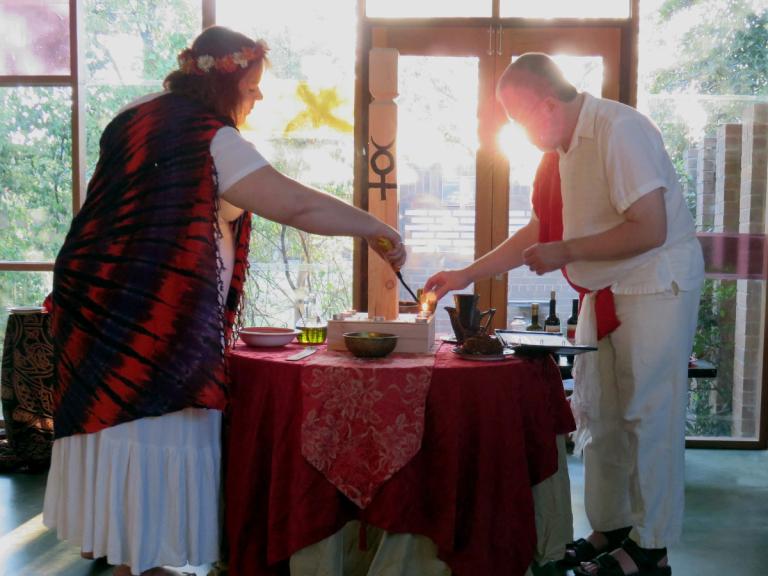 Do we really need full-time priests? Maybe advocacy and activism will be seen as a lay function rather than a priestly one. Maybe we separate the roles of celebrant and sacrificer. Maybe the Pagan priests of the distant future will resemble Buddhist monks more than Protestant ministers, living lives of contemplation and great simplicity. Most of us are technopagans.
Do we really need full-time priests? Maybe advocacy and activism will be seen as a lay function rather than a priestly one. Maybe we separate the roles of celebrant and sacrificer. Maybe the Pagan priests of the distant future will resemble Buddhist monks more than Protestant ministers, living lives of contemplation and great simplicity. Most of us are technopagans.
Christian ministers are expected to be experts at preaching, teaching, counseling, advocacy, and church management – there aren’t a lot of people who have all those skills. What if we had a team of bi-vocational priests: a ritualist, a diviner, a magician, a counselor . This would let people work to their strengths and wouldn’t expect all priests to be Lugh, Master of All Arts.
Building an Oracular Tradition
This is new (again) in Western society. The Baptist church where I grew up talked about Yahweh talking with prophets and Jacob wrestling with the angel, then said “but that doesn’t happen any more – God only speaks to us through the Bible.” I suggest this lack of first-hand religious experience is one of the primary reasons for the decline of mainline Protestantism.
We need to do better. If we don’t leave room for the Gods to speak to us, we’re building a religion that will stagnate. But what do we do, and how do we talk about ecstatic experiences in a world that thinks they’re self-delusion?
Temples and Public Rituals
As much as I’d love to have Pagan temples in every town, we don’t have the resources to build and maintain them now. But all of us can honor the Gods with a household shrine. As we come together in groups, our shrines can expand and our ritual spaces can grow into living rooms and back yards. After we outgrow that, we can rent public space – city parks, UU churches, and the like. Eventually, some of these groups will grow to the point they can build permanent temples.
Let them come – then we’ll build it.
Building a Public Presence
Pagans don’t proselytize, but we damn well better publicize. We need to let people know who we are, what we do, what we teach, and how to find us. Some traditions want to keep the occult in occult, but regardless of how occult your tradition is, there are ways to let people who need to find you know how to find you: websites, public rituals, social justice work, environmental work, and interfaith work.
The poet Lew Welch said “Guard the Mysteries! Constantly reveal them.”
If we’re going to build a priesthood we also need to build a laity. Not a hierarchy, but a natural division based on interests, skills, and dedication. Many of us at the forefront of the polytheist restoration are highly motivated and highly invested, but we need to make room for people who just want to honor the Gods and live honorable but ordinary lives.
What do we expect of ordinary polytheists (i.e. – non-priests)? I think we expect regular spiritual practice: prayer, meditation, worship, offerings and sacrifices. I think we expect to see Pagan virtues demonstrated, especially hospitality and reciprocity.
What if we stopped outsourcing social justice to clergy? What if building a better world here and now was considered everybody’s job?
Nobody wants a Pagan theocracy. Nobody wants a Pagan version of the Roman Catholic hierarchy, where priests are telling people how they have to live. In order to build a non-hierarchical society, we need an appreciation of all roles in a community, and we need to develop ways to listen. The only way to know if our polytheism is working is to continually ask.
Communication and Convocation
How do we share best practices, learn from each other, and get to know each other? How do you know who to call when you run into something you haven’t seen before? Remember Brendan Myers: ideas need institutions to flourish.
We already have blogs, websites, and social media. We need face-to-face gatherings like Many Gods West. And we need to create polytheist spaces at Pagan gatherings, not to hide from those who are different, but to spend uninterrupted time focused on polytheism.
Build Communities
So much of our current work is done individually, but as we grow we need to build strong, healthy communities. What can we do to accomplish this?
We can teach. Sometimes this is the traditional one-to-one mentorship. Other times it’s one-to-many: classes, books, podcasts, blogs, and such. And sometimes we help with referrals – I can teach Druidry, but if someone approaches me looking for something else I can refer them to a Heathen or a Hellenist or a teacher in another tradition.
We can be exemplars, living the kind of virtuous lives we want everyone else to live.
We can make a place for young people. This is hard for most Pagan groups, but our children are our future. We need to find ways to involve small children, teenagers, and young adults.
We can be organizers. Someone has to plan the rituals, the conferences, and all the other activities we want and need. Why not you?
We can make proper use of authority. There are two main ways authority is abused. One is through a lack of humility: a leader forgets why they’re there, or they think they know it all. The other way is through a lack of courage: don’t be afraid to assume and exercise authority when necessary. Pagans tend to fetishize consensus – sometimes somebody just needs to make a decision!
Make People in the Mainstream Culture Ready to Hear the Gods
Pagans don’t proselytize and the Gods can call who They want. But there are some people who, if Zeus Himself dropped a thunderbolt at their feet, would look up from their phones and say “Hmmm. I think it might rain.” People will only see what – and Who – they’re prepared to see.
The easiest and least-threatening way to expose people to the idea of many Gods is through storytelling. They can tell themselves they’re just myths, but myths have their own subtle magic.
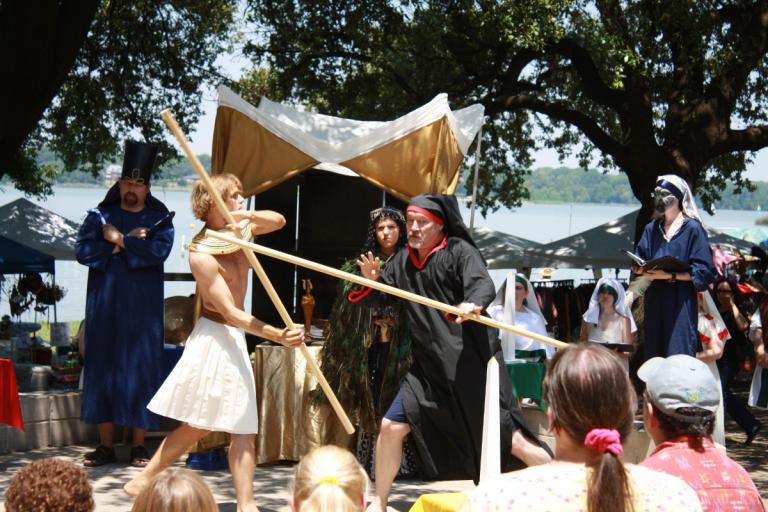 Perhaps the most effective way to make people ready is to be as “out” as you can. It’s easy for people who’ve spent their whole lives in our nominally-Christian, practically-atheist culture to think “oh, nobody really believes the Gods of the Greeks and Egyptians and Celts are anything more than characters in old stories”… until they meet someone who does.
Perhaps the most effective way to make people ready is to be as “out” as you can. It’s easy for people who’ve spent their whole lives in our nominally-Christian, practically-atheist culture to think “oh, nobody really believes the Gods of the Greeks and Egyptians and Celts are anything more than characters in old stories”… until they meet someone who does.
The Pitfalls of Institutions
Institutions are good and necessary things, but they aren’t perfect. For one thing, institutions are inherently conservative – in the original meaning of the word, not the Fox News meaning. This is a good thing – changes to sacred practices should be mindful and deliberate.
But particularly after the first generation, people in institutions may put the needs of institution ahead of its mission. The best example of this are the Catholic bishops who, when faced with evidence that priests were molesting children, attempted to protect the reputation of their church instead of upholding the mission of the church. In the end, they failed at both.
Don’t assume something similar can’t happen to us. Pagans and polytheists aren’t immune to the foibles of humanity.
Institutional Safeguards
There are many ways to safeguard against or at least mitigate the pitfalls of institutions. They include sharing best practices, adopting proven structures, instituting checks and balances, and especially avoiding concentrating power in one person.
Paganism in general is very bad with this. Sometimes it’s because our leaders are charismatic, but often it’s because our groups are small and it’s hard to find enough competent people to do everything that needs to be done. Just having a Board of Directors isn’t enough – real power has to be distributed, and that requires finding enough people willing and able to exercise power.
We need accountability. How are we held accountable to the commitments we make? How do we police our own and remove (or at least identify) bad apples? Are we unwilling to hold others accountable because we fear we’ll be held accountable for failing to live up to our own commitments?
We need succession plans, to insure our institutions will survive their founders. This means developing good systems instead of relying on extraordinary people. It means identifying and training successors, which requires providing opportunities for growth, and being willing to step aside when the time comes so a younger person can step up.
We need to maintain a living tradition. Are the Gods living? I certainly think so. Every living thing changes – why should we ever think the Gods don’t change? It’s fair to assume they don’t change quickly and they don’t change capriciously, and we must be careful not to project our desires onto the Gods. But religion is a human response to human conditions and experiences – our religion must change with the needs of the people and the world.
Mainly, it means holding our institutions loosely – stay focused on the mission and not the institution.
Preparing the Way of the Gods.
At the Many Gods West presentation, I asked if anyone was a second generation polytheist. One hand went half-way up. There have been individuals writing hymns to Pan and pouring offerings to Zeus for at least 200 years, but they were isolated individuals. We are the first generation to begin collectively restoring the Way of the Gods. There is SO much that needs to be done – it’s a challenge to keep our priorities in order and to keep our focus on practice.
When we build the institutions and infrastructure we need today, we prepare the Way of the Gods.
When we publicize and don’t proselytize, we prepare the Way of the Gods.
When we share our ideas and practices, support each other, and hold each other accountable, we prepare the Way of the Gods.
When we maintain a living tradition, we prepare the Way of the Gods.
The Gods of our ancestors are returning to the forefront, and They have called us to prepare the way for Them. It’s damn fine time to be a polytheist!



